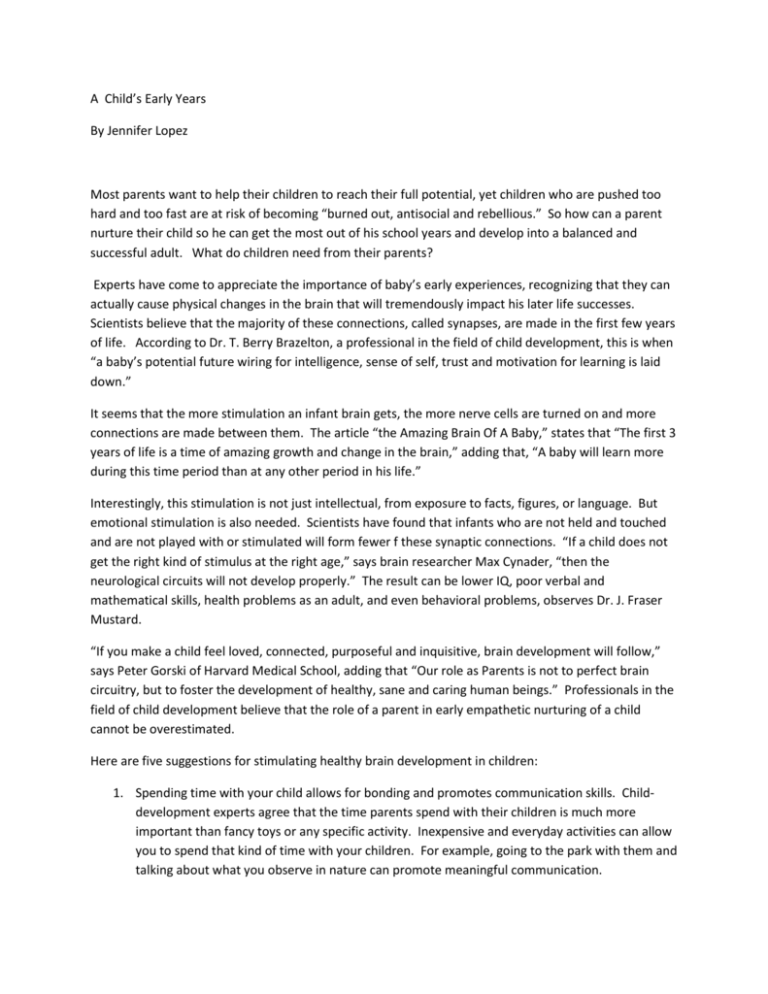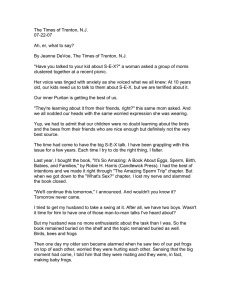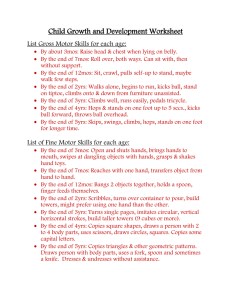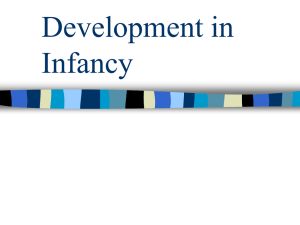A Child`s Early Years
advertisement

A Child’s Early Years By Jennifer Lopez Most parents want to help their children to reach their full potential, yet children who are pushed too hard and too fast are at risk of becoming “burned out, antisocial and rebellious.” So how can a parent nurture their child so he can get the most out of his school years and develop into a balanced and successful adult. What do children need from their parents? Experts have come to appreciate the importance of baby’s early experiences, recognizing that they can actually cause physical changes in the brain that will tremendously impact his later life successes. Scientists believe that the majority of these connections, called synapses, are made in the first few years of life. According to Dr. T. Berry Brazelton, a professional in the field of child development, this is when “a baby’s potential future wiring for intelligence, sense of self, trust and motivation for learning is laid down.” It seems that the more stimulation an infant brain gets, the more nerve cells are turned on and more connections are made between them. The article “the Amazing Brain Of A Baby,” states that “The first 3 years of life is a time of amazing growth and change in the brain,” adding that, “A baby will learn more during this time period than at any other period in his life.” Interestingly, this stimulation is not just intellectual, from exposure to facts, figures, or language. But emotional stimulation is also needed. Scientists have found that infants who are not held and touched and are not played with or stimulated will form fewer f these synaptic connections. “If a child does not get the right kind of stimulus at the right age,” says brain researcher Max Cynader, “then the neurological circuits will not develop properly.” The result can be lower IQ, poor verbal and mathematical skills, health problems as an adult, and even behavioral problems, observes Dr. J. Fraser Mustard. “If you make a child feel loved, connected, purposeful and inquisitive, brain development will follow,” says Peter Gorski of Harvard Medical School, adding that “Our role as Parents is not to perfect brain circuitry, but to foster the development of healthy, sane and caring human beings.” Professionals in the field of child development believe that the role of a parent in early empathetic nurturing of a child cannot be overestimated. Here are five suggestions for stimulating healthy brain development in children: 1. Spending time with your child allows for bonding and promotes communication skills. Childdevelopment experts agree that the time parents spend with their children is much more important than fancy toys or any specific activity. Inexpensive and everyday activities can allow you to spend that kind of time with your children. For example, going to the park with them and talking about what you observe in nature can promote meaningful communication. 2. Play is also essential for your child’s developing intellectual, emotional, and social skills. The toys your child uses in unstructured play can be very simple, such as an empty cardboard box. Safe, everyday household items are just as intriguing to infants as expensive high-tech toys. Dr Mustard adds, “Children develop the wiring of their brains for a full variety of functions primarily through play.” On the other hand, over scheduling children with countless adult-led activities could stifle their imagination and creativity. Allow your child to explore his own little world, many times a child will find something to do to entertain himself. 3. Reading to your children is another important way to stimulate his synaptic connections. Linda Siegel, a professor of education, cautions regarding the content of what is read: “It should be at a level that children enjoy.” Also try to keep the reading regular and at the same time each day. That way the child begins to look forward to it. Some parents incorporate complementary activities such as drawing, painting, playing music, etc along with their reading. 4. Teaching your child also includes discipline, which can take many forms. It can take the form of correction by the spoken word, or denial of privileges, or other forms of punishment. Dr. Brazelton, quoted earlier, says that discipline is “about teaching a child how to manage feelings and out-of control behaviors. Every child is looking very hard for limits. After love, discipline is the most important thing you give.” 5. Awake! magazine says, “Children are like young plants that develop and thrive when nurtured with regular, loving attention. Water and sunlight nourish a young plant and stimulate healthy growth and stability. Similarly, parents who shower their children with verbal and physical expressions of love will nurture their children’s mental and emotional growth and stability.” The Bible states simply: “Love builds up.” Therefore parents should be generous in their expressing love to their children. Our children are a precious gift. The affection you show, the bedtime stories you read, and even the games you play are all crucial elements of your child’s development and can help them in reaching their full potential as happy, caring members of our community. This information has been taken from; Parents As Teachers Parent Handout, How Your Young Child Learns; PAT Parenting Tips, Helping Your Child Learn Self-Regulation Through Play; and Awake! article, The Amazing Brain of A Baby. If you would enjoy more information on child development or would enjoy personal home visits with your child please call the Parents As Teachers office at 356-4245. Submitted by Jennifer Lopez











